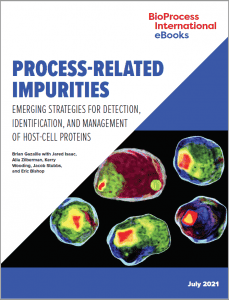eBook: Process-Related Impurities — Emerging Strategies for Detection, Identification, and Management of Host-Cell ProteinseBook: Process-Related Impurities — Emerging Strategies for Detection, Identification, and Management of Host-Cell Proteins
July 29, 2021
 Host-cell proteins (HCPs) represent a major class of process-related impurities (PRIs) that are generated during biopharmaceutical manufacture. Although the vast majority of such proteins are removed from a drug substance during downstream purification, residual HCPs can remain in a finished drug product. Even in minimal concentrations, copurifying HCPs can pose safety risks and compromise protein-product yield, efficacy, and stability. Thus, regulatory agencies consider the presence of HCPs to be a critical quality attribute (CQA). Sufficient clearance of these impurities helps to establish a bioprocess’s robustness. But HCP detection is easier said than done.
Host-cell proteins (HCPs) represent a major class of process-related impurities (PRIs) that are generated during biopharmaceutical manufacture. Although the vast majority of such proteins are removed from a drug substance during downstream purification, residual HCPs can remain in a finished drug product. Even in minimal concentrations, copurifying HCPs can pose safety risks and compromise protein-product yield, efficacy, and stability. Thus, regulatory agencies consider the presence of HCPs to be a critical quality attribute (CQA). Sufficient clearance of these impurities helps to establish a bioprocess’s robustness. But HCP detection is easier said than done.
This eBook explores strategies for HCP detection, identification, and management that were presented at the ninth annual BioPharmaceutical Emerging Best Practices Association (BEBPA) Host Cell Protein Conference. This year’s program featured considerations for transitioning between commercial HCP kits and platform assays, advances in high-throughput assay technologies, the increasing importance of liquid chromatography–mass spectrometry in HCP analytics, and novel strategies for detecting and addressing HCP-related excipient degradation.
Then, authors from eBook sponsor Cygnus Technologies describe how the company’s antibody affinity extraction (AAE) chromatography process coupled with mass spectrometry can enhance HCP identification and quantification. The authors demonstrate that AAE steps can deplete drug substance within a sample and enrich its HCP populations, enhancing mass spectrometric analyses.
Fill out the form below to read the complete eBook now.
You May Also Like






